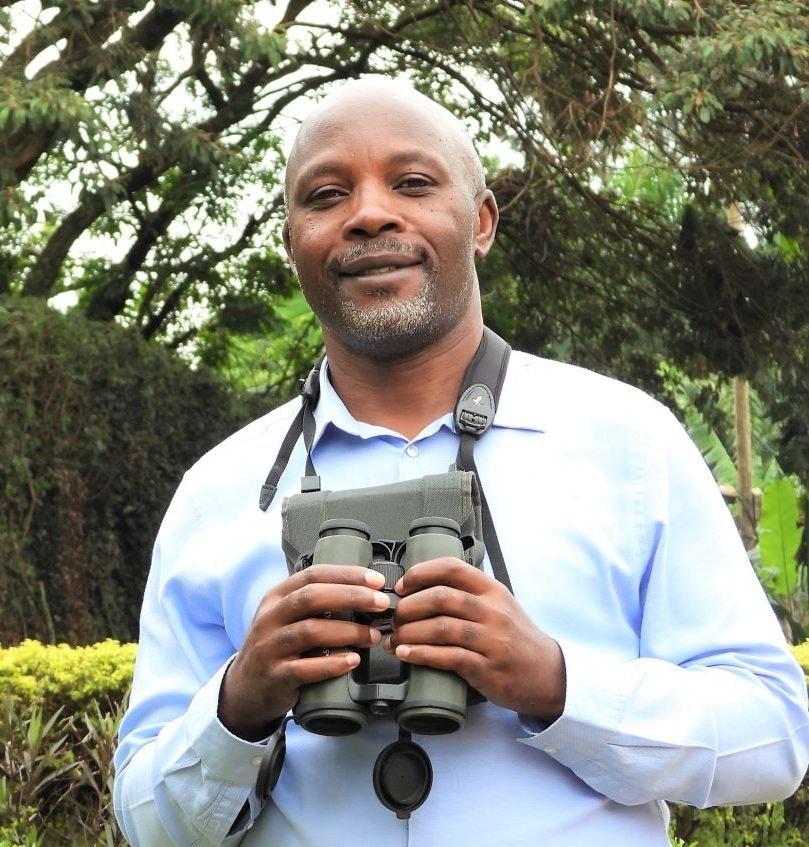Not so long ago, the wetlands of Uganda were known simply as ‘wastelands’ and villagers were given government grants to drain them. Now their ecological importance is acknowledged, but the battle to conserve them continues. Nabajjuzi wetland in Masaka is globally important and contains many threatened species including the Sitatunga swamp antelope, the Shoebill and the Papyrus Yellow Warbler. It is also the sole source of water for over half a million people living in nearby Masaka town. But uncontrolled human activities such as waste disposal, over extraction of materials and hunting of the threatened species, mean that the wetland is critically threatened, despite its immense importance for both biodiversity and local people.
Achilles Byaruhanga, winner the 2004 Whitley Award for Birdlife Conservation sponsored by the Studs Trust, is working with local communities to help them understand the value of the wetlands while also helping them boost their livelihoods through community-led conservation activities such as ecotourism, agro-forestry and bee keeping.

Achilles is aware of the vital importance of involving local people in order to conserve wetlands: ‘Wetlands are not protected in Uganda. In fact, if they fall within a national park, they are specifically not covered by conservation legislation. Instead, they belong to ‘the people’ and it is the people that can choose what happens there.’

In Nabajjuzi, a shortage of land means people’s current choice is to drain the wetlands to create areas suitable for farming. Achilles said: “Conversion is the main problem here so we are trying to show people they can still make a living even without converting the land. For example, if they keep goats instead of cows, they don’t need to alter the environment at all. We are trying to persuade them not to hunt or capture endangered species but instead to develop other sources of revenue such as creating good quality handicrafts from papyrus and initiating agroforestry products such as fruit and honey.”
Nabajjuzi lies conveniently close to the main trunk route between Kampala and western Uganda where tourists go to see gorillas, elephants and chimpanzees, and therefore has great potential as an ecotourism destination.
2005: PROJECT UPDATE
Since winning his Whitley Award, Achilles has helped boost local livelihoods by developing this opportunity, establishing an observatory from which the waterfowl and other wildlife can be viewed without disturbance. The new observatory was opened on World Wetlands Day in February 2005 by the Hon. Minister of State for the Environment. Both local people and tourists are enjoying the new facility which incorporates an office for the wetland guide and a room for local community crafts. The observatory has quickly revealed further information about the species using Nabajjuzi, which qualifies as an Important Bird Area (IBA). Nabajjuzi has now been proposed for designation as a Ramsar site.
In addition to the observation tower, Achilles and his team have established several small demonstration plots to show local people how parts of the wetland can be used sustainably, providing food and income through low impact livestock grazing, reed weaving and beekeeping. This has been combined with a public awareness campaign and distribution of educational materials in the local language to highlight the importance of wetlands and the success of the project to local people.
The project has been well received: in addition to training locals to produce high quality papyrus products for sale at the observatory, which has improved income, Achilles has helped improve the quality of life through introducing ecological sanitation technologies. Achilles now hopes the initiatives developed at Nabajjuzi will provide a model for similar ecotourism initiatives at the national level.
2006: NABAJJUZI DESIGNATED AS A RAMSAR SITE
Uganda has added nine wetlands, including Nabajjuzi, to the List of Wetlands of International Importance designated under the Ramsar Convention, bringing the national total to 11 sites covering a total of 354,803 ha.
“This is a wonderful step for conservation in east Africa,” said Achilles Byaruhanga, Executive Director of Nature Uganda, the BirdLife Partner in Uganda. The Convention on Wetlands, signed in Ramsar, Iran, in 1971, is an intergovernmental treaty which provides the framework for national action and international cooperation for the conservation and wise use of wetlands and their resources.
To read more, please click here.
2020: CONTINUATION FUNDING
Strengthening livelihoods in communities reliant on wetlands and conservation of the Grey Crowned Crane
£70,000 over 2 years
The Kaku-Kiyanja wetlands form a significant part of the Lake Victoria catchments and host over 100 breeding pairs of Grey Crowned Cranes – the highest number anywhere in Uganda. Despite being the national bird its population has declined by over 80% in 25 years, with threats including the smuggling of chicks.
Its wetland habitat is also vulnerable to clearance and drainage for subsistence agriculture, the introduction of non-native species and unsustainable harvesting of resources. This pressure has only increased as COVID-19 causes people to lose income and return to rural areas from urban centres. In turn, these actions reduce wetlands’ capacity to provide ecosystem services like water security. Across Uganda, wetlands have reduced from 13% in 1993 to 8% in 2019.
Achilles aims to designate Kiyanja wetlands as a Ramsar site and promote it as a wetland reserve. With Continuation Funding, he and his team will restore 20 ha of degraded environment and train 20 crane custodians to ensure breeding success. They will also develop 5 conservation agreements to improve community livelihoods through climate smart agriculture innovations such as reducing soil erosion and improving land productivity. Achilles will partner with fellow Whitley Award winner, Jimmy Muheebwa, on this project to safeguard Uganda’s wetlands and their Grey Crowned Crane.




